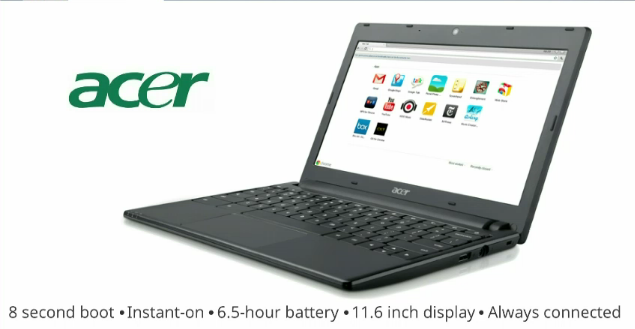Google Chromebook pilots ahead: What we can learn from the CR-48?

Google's Chromebook will be officially available June 15 and a bevy of corporate pilots are likely to follow. After all, the Chromebook will at least warrant enterprise investigation given the potential costs savings.
Can the Chromebook trump the thin client? How about the desktop? Will the Chromeb
With those questions looming, we caught up with Glenn Weinstein, chief technology officer of Appirio. Weinstein handed CR-48s---a precursor to the Chromebooks coming June 15---to all 250 U.S. employees in a pilot to see what would happen. Appirio workers get a choice of a Dell laptop or Apple MacBook Pro. Weinstein wanted to see how the Chromebook would be used in the field.
For perspective, Appirio is a software as a service and cloud systems integrator that specializes in doing things like connecting Google Apps to Salesforce implementations. Appirio is rated as a "strong performer" in the Salesforce.com implementation market, by Forrester.
Here's where Appirio fits in the Salesforce.com landscape:
With that backdrop it's no surprise that Appirio---the largest reseller of Google Apps---was an early Chromebook tester. Here's a look at Weinstein's top takeaways from the CR-48 (right), a clunky, underpowered notebook that still found users. Also:
- The Chromebook was used as a complement to other devices. "We gave to the CR-48 to employees and see what they would do with it and when they would revert to their laptops," said Weinstein. "Three months in the CR-48 exceeded expectations. The majority of employees are using the CR-48s every day, but not all day."
That usage is notable given the hardware imperfections of the CR-48, which had trackpad issues and was pretty basic. Samsung and Acer's hardware will be much more polished and will be able to handle cameras being added to the Chromebook etc.
- Consultants reverted back to laptops when on customer sites. Weinstein noted that consultants had trouble with the Chromebook on customer sites that used Outlook. In other words, Appirio, which uses Google Apps, was a natural fit for the Chromebook internally. Externally, the Chromebook may be trickier to use if partners aren't cloud ready or SaaS happy.
- Desktop sharing was a hang-up in the CR-48 pilot. Weinstein said one of the big hurdles with the first Chromebook pilot was the lack of support for desktop sharing. Appirio uses Citrix's GoToMeeting a lot. "We do a lot of desktop sharing and not having a GoToMeeting client was tough," he said. "We expect that hurdle to be crossed."
- The Chromebook will ride shotgun with Apps customers---at first. Weinstein is waiting to get into the next Chromebook program since Appirio is interested in the devices as a reseller and customer. Weinstein thinks that Chromebooks may appeal to current Google Apps customers. Appirio deployed Google Apps at Genentech, International Hotels Group and Motorola so there's a big enterprise base to start seeding Chromebook accounts. Weinstein expects that the Chromebook and Apps will ultimately be bundled---at least that's Appirio's plan as a reseller.
- Chromebooks can find a role in the enterprise. “The perception is that the Chromebook won't be appropriate for certain companies," said Weinstein. "You need to look at job titles more than companies. Most of the workforce can work on a browser-only machine," he said.
- Google has a good total cost of ownership case with the Chromebook. Weinstein said Appirio's costs are really low for desktop clients. Since the company doesn't have a virtual private network, most of the laptop costs are related to the machines, customer care programs from Apple and Dell and helpdesk costs. In a nutshell, Appirio is paying $125 a month per employee for PCs. Most enterprises are pushing $400 a month. Weinstein said at $28 a month for the Chromebook his full cost with helpdesk support will probably be more like $50 a month per user. "The savings will be much more dramatic for other enterprises," said Weinstein. "Couple the Chromebook savings with Apps and moving off Exchange and there's a nice TCO story." Also: Google's Chromebook for business: Interesting math, but your mileage will vary
- Change management costs will depend on culture. Appirio spends a lot of time on change management with Apps deployments. The focus is on executives and their assistants, who spend the most time with Google Mail and Calendar. Weinstein thinks that Chromebooks will have a cool factor that will help get employees on board. Chromebooks will be gradually adopted much like Google Apps has.
- The security story will sell. "The Chromebook can't store data on the hard drive and that means more secure computing," said Weinstein. "If you look at the high publicity data breaches a lot of them come down to stolen laptops and client side problems. If you remove that lost laptop scenario it's more secure." When asked about a stored password on a Chromebook, Weinstein noted that Apps and Chromebooks will support two-factor authentication. "When you lose a Chromebook you just get a new one," he said.
My take: The key for Chromebook pilots will be supporting the must-haves in the enterprise. Google's partnership with Citrix is key and further details on a VMware partnership will also be welcome. The Chromebook doesn't have to do everything, but just enough to become a complement. The economic story is there and that will generate plenty of interest. In the short run, Chromebooks will appeal to companies already using Google Apps. Whether it's Chromebook, desktop virtualization or something else, the long-term trend is in place: Companies are going to be looking to ditch the laptop management business.
Related: